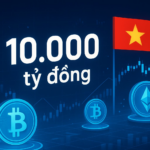From June 1st, according to Decree 70/2025/ND-CP, individuals and households with an annual revenue of 1 billion VND or more are mandated to use e-invoices generated from cash registers connected to the tax authority. While this regulation aims to enhance transparency in business operations, it has also caused concern and confusion among many small businesses.
Avoiding bank transfers for peace of mind?
Many small business owners and traders have shared a tip to avoid potential issues: not accepting bank transfers and only accepting cash payments. The main reason behind this is the fear that tax authorities will base their assessments on total transaction values, leading to unexpected tax demands or higher tax rates than what they are currently paying.
Ms. Thu Hong, owner of a grocery store in Thu Duc City, Ho Chi Minh City, shared that she stopped accepting bank transfers starting June 1st. “Customers often transfer a larger amount than the cost of their purchase, sometimes in the millions, and ask me to return the excess in cash,” she explained. “If the tax authority bases their assessments on total transaction values, my revenue could be overstated, while my profit per item is only a few thousand dongs. So, to avoid any issues, I’ve decided not to accept bank transfers. If someone really needs to transfer money, they must transfer the exact amount without any excess.”

Traders at Ben Thanh Market, District 1, Ho Chi Minh City. Photo: Tan Thanh
Regarding e-invoices, Ms. Hong expressed her concerns about the lack of clarity in the new regulations. “Even for a bag of ice worth 1,000 – 2,000 VND, I have to issue an e-invoice, although customers don’t need it,” she said. “Without any invoices for input costs, but with many invoices for output, I’m afraid I’ll be unfairly taxed. I’m not trying to evade taxes, but at the moment, I really don’t know where to start.” She expressed her desire to continue with the current tax estimation method and requested clear guidance on the new system.
Ms. Thu Phuong, owner of a noodle shop in Ho Chi Minh City, shared similar concerns. She explained that she couldn’t obtain invoices from older traders at the market for her input costs, while she was required to issue invoices for her output. This mismatch made her worry about being subjected to unfair taxation. “If I’m forced to issue invoices, I’ll have to increase my prices, but the competition in this area is fierce, and raising prices means losing customers,” she said. “So, for now, I prefer to accept cash payments.”
In addition to revenue concerns, many small businesses are also thinking about the extra costs of hiring someone to handle invoices and bookkeeping. They believe that without a clear roadmap, this transition will create additional burdens, affecting both the business owners and their customers.
On social media, the small business community expresses confusion and anxiety. Many have temporarily halted their operations to monitor the situation. Some money transfer service providers have even stopped operating due to fears of being taxed on the total transaction values, despite only earning a few thousand dongs in fees per transaction.
Ms. Tran Thi Sen, owner of a grocery store in Go Vap District, Ho Chi Minh City, raised another concern. She has been paying a fixed tax of 1.5 million VND per month since the beginning of the year. However, with the implementation of e-invoices, actual revenue will be recorded. She wonders if she will continue to pay the fixed tax or switch to a tax calculation based on invoices.
Avoiding taxes with cash is not an option
According to Ms. Tran Thi Cam Hong, Director of VIFATAX Tax Consulting and Services Company Limited, the belief that avoiding bank transfers will evade tax supervision is a subjective and outdated notion in the context of modern management methods. Moreover, when transacting in cash, it is challenging for sellers to prove their sales volume, especially when their input costs are often supported by invoices from partners. Tax authorities can rely on various data sources, including bank account information, transaction flows, input invoices, and more, to verify actual revenue. “Displaying a ‘cash only’ sign is a red flag for tax authorities and may lead to suspicions of tax evasion,” Ms. Hong emphasized. “Additionally, charging customers extra for bank transfers (e.g., a 1.5% tax) is illegal and will result in penalties.”
Ms. Nguyen Thi Cuc, Chairman of the Vietnam Tax Consultants’ Association, raised a question: “Many businesses refuse to accept bank transfers or provide vague transfer details, indicating possible tax evasion. The current tax policy does not differentiate between cash and non-cash payments, so have these businesses been paying their taxes correctly up until now?”
Meanwhile, Ms. Nguyen Ngoc Tinh, Vice Chairman of the Ho Chi Minh City Tax Consultants’ Association, expressed empathy for the concerns of small businesses, attributing them largely to a lack of information. However, she clarified that using personal accounts, failing to provide clear transfer details, or deliberately ignoring transactions is a violation and may result in penalties.
The new regulations aim to bring transparency to the market, create a level playing field for businesses, and eliminate unregulated and untraceable goods. However, one of the main concerns of small businesses today is the declaration of inventory before switching from the fixed tax estimation method to the new system in 2026. While this inventory was legally acquired under the fixed tax model, it may not comply with the new declaration model.
Despite these concerns, Mr. Tinh reassured small businesses that in the past, many entities have successfully transitioned from households to enterprises and received significant support. “With proper guidance, this transition can provide access to preferential policies and opportunities for expansion,” the expert emphasized.
Ms. Hong Loan, owner of a coffee shop and a fish noodle restaurant in Go Vap District, currently operates under two legal entities: an enterprise and a household business. She uses the household business entity for the fish noodle restaurant because the ingredients are purchased from market traders who do not provide invoices. While she can obtain invoices from corporate suppliers, the prices are higher, and the ingredients may not be sufficient. “Without invoices for input costs, a high output may lead to higher tax assessments due to perceived high profits, even though this may not be the case,” Ms. Hong Loan explained. Therefore, she has temporarily postponed converting the restaurant into an enterprise, awaiting detailed guidance by the end of the year.
From a management perspective, the Tax Authority of Region I warns that displaying signs like “cash only” or using vague transfer descriptions such as “borrowed money,” “coffee money,” or “shipping fee” will not reduce tax obligations but may instead arouse suspicion of hidden revenue. Additionally, charging customers extra for bank transfers is a violation and will be penalized. The tax authority requests that businesses thoroughly understand the legal regulations, truthfully declare and fully pay their taxes. Any intentional tax evasion or fraud will be subject to severe consequences, including tax arrears collection, fines, and even criminal liability in serious cases.
Meanwhile, the leader of the Tax Authority of Region II clarified that the fixed tax estimation method has not been abolished. From now until the end of 2025, businesses subject to the e-invoice application will still pay taxes based on the fixed amount determined at the beginning of the year. However, if the revenue recorded in the invoices is higher than the fixed amount, the tax authority will adjust the tax rate accordingly.
Transitioning to an enterprise brings advantages
Mr. Le Van Nam, Director of Hai Dinh Food Co., Ltd. in Dong Thap Province, who recently transitioned from a household business to an enterprise in late 2024, attributed the resistance to change mainly to psychological barriers. In reality, he found that the decision to become an enterprise was the right one. With the enterprise status, he gained access to various government support programs and trade promotion activities. Recently, Hai Dinh Food participated in the Thaifex Anuga 2025 exhibition in Thailand for the first time. “Becoming an enterprise does not mean paying more taxes,” Mr. Nam shared. “If there are any uncertainties, local officials are ready to provide guidance, and professional services can also be engaged.”
Additionally, with the upcoming mandatory social insurance for household businesses, the transition to an enterprise model will be much smoother.
The Art of Governance: Navigating the Selection of Post-Merger Commune-Level People’s Committee Chairpersons
“The Ministry of Home Affairs prioritizes the selection and placement of individuals with exceptional leadership qualities and state management experience. We seek innovative and creative thinkers who are willing to take risks and embrace responsibility for the greater good.”
Uncovering a Massive Scam: Mastermind Behind the $50 Million Web of Deceit Arrested
“Unraveling a complex web of cybercrime, the investigation has revealed a network of tech-savvy individuals who orchestrate illegal activities with finesse. These perpetrators, with a deep understanding of technology, have been managing an unauthorized online payment intermediary system, seamlessly integrated with illicit online gaming portals based on foreign IP addresses. Their sophisticated tactics present a unique challenge, demanding an equally adept response.”
The Crypto Asset Floor’s $10 Billion War Chest: Even Securities ‘Giants’ Are Left in the Dust.
The staggering figure of 10,000 billion VND in chartered capital far surpasses the requirements for industries such as banking, insurance, and aviation.





















